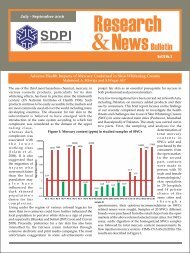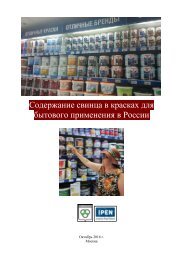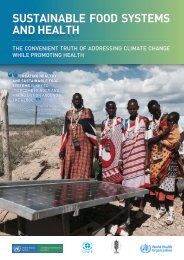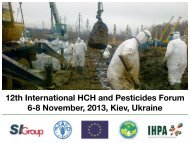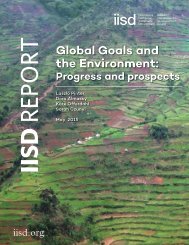Women and Chemicals
WomenAndChemicals_PublicationIWD2016
WomenAndChemicals_PublicationIWD2016
Create successful ePaper yourself
Turn your PDF publications into a flip-book with our unique Google optimized e-Paper software.
Existing initiatives<br />
The Gender <strong>and</strong> Non-Discrimination Program of the ILO Training<br />
Centre in Turin offers regular training courses in gender<br />
mainstreaming <strong>and</strong> publishes a wide range of gender specific<br />
training materials.<br />
Although ILO conducts much work on women-related topics,<br />
like equal pay, maternity, <strong>and</strong> occupational health, specific <strong>and</strong> recent<br />
information about women <strong>and</strong> chemicals was not available.<br />
In a new report „Safety <strong>and</strong> Health in the Use of <strong>Chemicals</strong> at Work“<br />
(2014) 7 very much useful information is compiled about how to<br />
deal with chemicals at the workplace. However, no gender mainstreaming<br />
or gender disaggregated data is mentioned.<br />
Non-governmental organisations<br />
Many implementation projects in the field <strong>and</strong> some research<br />
on the issue of chemicals <strong>and</strong> women come from non-governmental<br />
organisations. They are active in all areas covered<br />
by this study like research, awareness raising, capacity building,<br />
information campaigns, <strong>and</strong> advocacy work on the national,<br />
regional <strong>and</strong> international level. They also take care of<br />
victims of chemical-related diseases <strong>and</strong> accidents <strong>and</strong> act as<br />
watch dogs for corruption <strong>and</strong> bad governance of companies.<br />
International networks working on chemicals include the International<br />
POPs Elimination Network (IPEN), the Pesticides<br />
Action Network (PAN), <strong>Women</strong> International for a Common<br />
Future (WICF), Health Care Without Harm (HCWH), <strong>and</strong> the International<br />
Society for Doctors for the Environment (ISDE)<br />
among others. We estimate that there are around 1000 NGOs<br />
worldwide working on chemicals <strong>and</strong> pesticides. Examples of<br />
their work are highlighted in this study as boxes linked to the<br />
related content issues.<br />
Business<br />
Chemical business associations focus in their work mainly on<br />
women in their role as scientists <strong>and</strong> corporate leaders. In 2011<br />
Cefic, the European Chemical Industry Association hosted an<br />
event called “European <strong>Women</strong>: Innovating for Smart, Sustainable<br />
<strong>and</strong> Inclusive Growth”, which addressed topics like “lessons<br />
learned by leading women in science <strong>and</strong> innovation in Europe”<br />
<strong>and</strong> “opportunities for increasing women’s role in achieving the<br />
Europe 2020 vision through science <strong>and</strong> innovation”. Dow <strong>Chemicals</strong><br />
<strong>Women</strong>’s Innovation Network (WIN) focuses on “engaging<br />
women <strong>and</strong> catalysing culture change”. 8 WIN offers mentoring<br />
<strong>and</strong> networking opportunities, <strong>and</strong> provides access to professional<br />
development tailored to the unique needs of women at<br />
critical career stages, mainly within the company. 9 It is hard to<br />
find industry data <strong>and</strong> projects addressing directly women who<br />
are exposed to chemicals at their living or work place. The Re-<br />
List of NGOs working on<br />
women <strong>and</strong> chemicals issues<br />
(not comprehensive):<br />
International POPs Elimination Network (IPEN),<br />
www.ipen.org<br />
<strong>Women</strong> International for a Common Future<br />
(WICF/WECF), www.wecf.eu<br />
Pesticides Action Network (PAN),<br />
www.pan.org<br />
The Collaborative on Health <strong>and</strong> Environment<br />
(CHE), www.health<strong>and</strong>environment.org<br />
Health Care Without Harm (HCWH),<br />
www.noharm.org<br />
Commonweal,<br />
www.commonweal.org<br />
Health <strong>and</strong> Environment Alliance (HEAL),<br />
www.env-health.org<br />
Eco Accord (Russia),<br />
www.ecoaccord.org<br />
<strong>Women</strong>´s Voices for the Earth, (USA),<br />
www.womensvoices.org<br />
Global Alliance for Incinerator Alternatives<br />
(GAIA), www.no-burn.org<br />
Sustainlabour,<br />
www.sustainlabour.org<br />
Balifokus (Indonesia),<br />
www.balifokus.asia<br />
National Toxics Network (Australia),<br />
www.ntn.org.au<br />
Greenwomen (Kazakhstan),<br />
www.greenwomen.kz<br />
Social-Eco Fund (Kazakhstan)<br />
Breast Cancer Fund (USA),<br />
www.breastcancerfund.org<br />
Breast Cancer UK,<br />
www.breastcanceruk.org<br />
Environmental Working Group (USA),<br />
www.ewg.org<br />
Alaska Community Action on Toxics<br />
(ACAT), www.akaction.org<br />
Center for Environmental Justice<br />
(Sri Lanka), www.ejustice.lk<br />
LEADERS (Nepal),<br />
www.leadersnepal.org.np<br />
European Environmental Bureau<br />
www.eeb.org<br />
58



